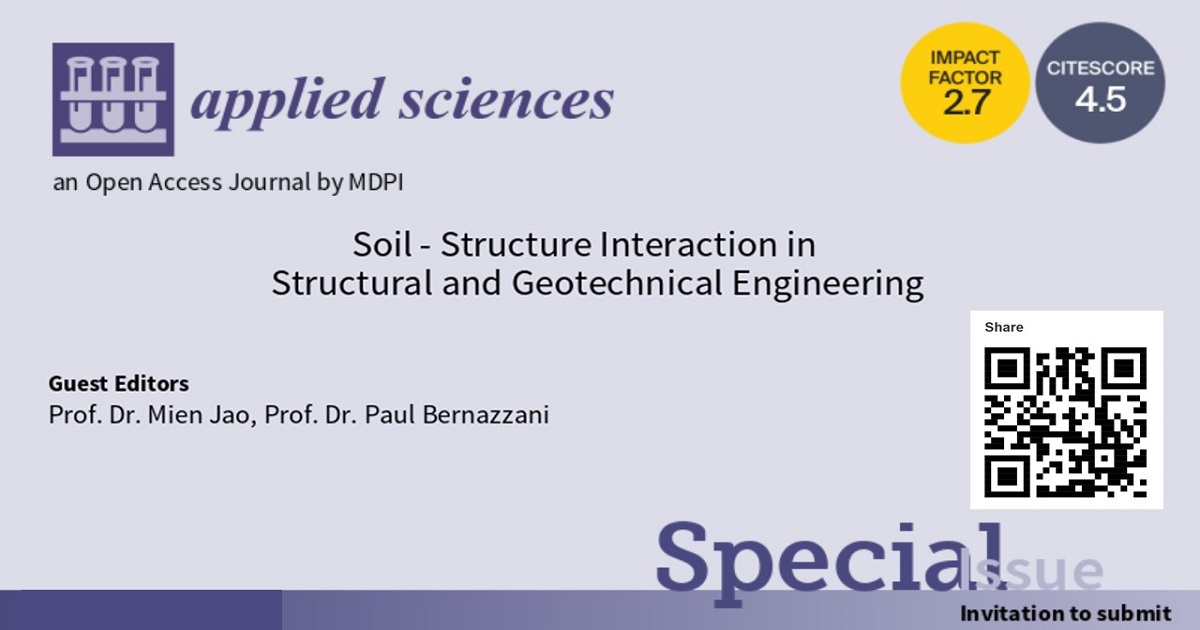Soil-Structure Interaction in Structural and Geotechnical Engineering
A special issue of Applied Sciences (ISSN 2076-3417). This special issue belongs to the section "Civil Engineering".
Deadline for manuscript submissions: 20 April 2025 | Viewed by 12755

Special Issue Editors
Interests: soil evaluation and stabilization; foundation/pile/wall system evaluation; numerical modelling in geotechnical engineering
Special Issues, Collections and Topics in MDPI journals
Interests: chemical physics; molecular behavior of macromolecules; kinetic and thermodynamic study in simple and complex systems such as polystyrene and proteins for a wide of range applications, from soil stabilization to polymer processing and drug design
Special Issue Information
Dear Colleagues,
This Special Issue is interested in the current technology available for studying soil-structural interaction (SSI) in structural and geotechnical engineering, including the study of the interaction between foundation, soil, and adjacent structures. It addresses the latest findings on numerical and physical modeling, case studies, and analytical approaches, as well as seismic analysis/design methods and soil liquefaction.
This Special Issue seeks to address recent advances in the following areas:
- Numerical modeling in geotechnical/structural engineering related to SSI;
- Physical modeling in geotechnical/structural engineering related to SSI;
- SSI for seismic analysis/design of buildings, bridges, and other structures;
- Impact of interactions between foundations and adjacent structures/wall systems on soil behavior;
- Case studies on the impact of soil properties on SSI;
- Design and other methods to mitigate SSI or soil liquification damages;
- Economic cost analysis and efficacy with different approaches to mitigate adverse effects of SSI.
It is our pleasure to invite you to submit manuscripts to this Special Issue. Full papers, technical notes, case studies, communications, and reviews are all welcome.
Prof. Dr. Mien Jao
Prof. Dr. Paul Bernazzani
Guest Editors
Manuscript Submission Information
Manuscripts should be submitted online at www.mdpi.com by registering and logging in to this website. Once you are registered, click here to go to the submission form. Manuscripts can be submitted until the deadline. All submissions that pass pre-check are peer-reviewed. Accepted papers will be published continuously in the journal (as soon as accepted) and will be listed together on the special issue website. Research articles, review articles as well as short communications are invited. For planned papers, a title and short abstract (about 100 words) can be sent to the Editorial Office for announcement on this website.
Submitted manuscripts should not have been published previously, nor be under consideration for publication elsewhere (except conference proceedings papers). All manuscripts are thoroughly refereed through a single-blind peer-review process. A guide for authors and other relevant information for submission of manuscripts is available on the Instructions for Authors page. Applied Sciences is an international peer-reviewed open access semimonthly journal published by MDPI.
Please visit the Instructions for Authors page before submitting a manuscript. The Article Processing Charge (APC) for publication in this open access journal is 2400 CHF (Swiss Francs). Submitted papers should be well formatted and use good English. Authors may use MDPI's English editing service prior to publication or during author revisions.
Keywords
- soil-structural interaction
- soil liquification
- seismic analysis
- foundation and adjacent structure system
- numerical and physical modeling
Benefits of Publishing in a Special Issue
- Ease of navigation: Grouping papers by topic helps scholars navigate broad scope journals more efficiently.
- Greater discoverability: Special Issues support the reach and impact of scientific research. Articles in Special Issues are more discoverable and cited more frequently.
- Expansion of research network: Special Issues facilitate connections among authors, fostering scientific collaborations.
- External promotion: Articles in Special Issues are often promoted through the journal's social media, increasing their visibility.
- e-Book format: Special Issues with more than 10 articles can be published as dedicated e-books, ensuring wide and rapid dissemination.
Further information on MDPI's Special Issue polices can be found here.





